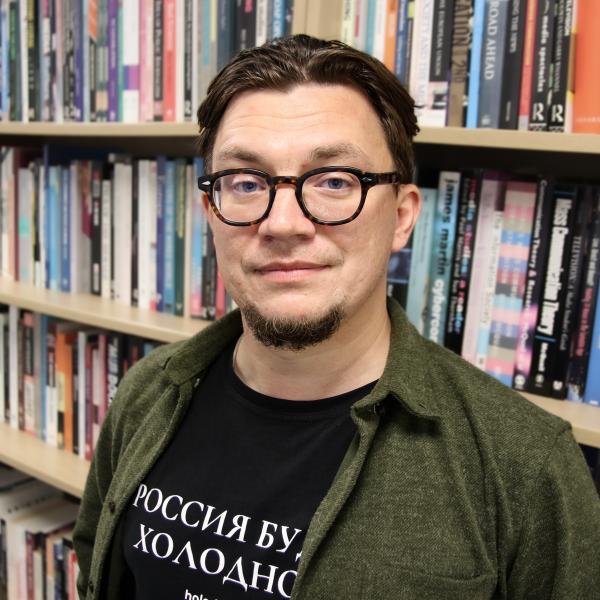International Public and Political Communication MA
School of Information, Journalism and Communication,
Faculty of Social Sciences
-
Start date
September 2026 -
Duration
1 year -
Attendance
Full-time
Explore this course:
Apply now for 2026 entry or join us on a discovery afternoon to see where a Sheffield masters could take you.

Course description
We are continually surrounded by differing viewpoints and messages. This content is shaped in different ways, advocating viewpoints and constructing campaigns to influence public opinion, audiences and policymakers.
Our course teaches you to be an expert in both the analysis and development of messages from groups such as political parties, public and governmental institutions, pressure groups, charities and NGOs.
You'll learn about media relations, political marketing and the scope and significance of political communication. You'll also develop skills in persuasive communication, including communicating with the media, media training, and using different media outlets to promote ideas through advocacy and lobbying.
Our teaching provides a thorough, critical understanding of key debates around the intersection of the media and international public and political communication.
Modules
Core modules:
- Visual political communication
-
This module will introduce students to key conceptual/methodological debates concerning the role, function and impact of images and visual representations within contemporary forms of political communication. Focusing on a variety of communication, media and journalism-based media and contexts (i.e. photojournalistic coverage of war/conflict/terrorism, the role of images within political campaigns, political cartoons, visual representations of minority groups, etc.), and actors (e.g. politicians, NGOs, marketing and PR professionals, terrorist organisations, protest movements, etc), the module will to equip students with the critical and analytical skills for interrogating and creating dominant modes and methods of visual political communication.
15 credits - Media, Society and International Crises
-
This module examines the relationship between media, political bodies, NGOs, and wider societal actors at the outbreak of international crises. It looks into particular cases of recent international crises and early reportage, questions the emerging media and political representations, and evaluates them in light of theories of perception, identity, and reactions to uncertainty. In this module students will conduct a research project into the early media coverage of a crises, interview journalists, participate in a modelling exercise of political, public and media reactions to an international crisis and relate early coverage to later narratives found in media and film.
15 credits - Research Methods
-
This module is designed as an introduction to social scientific research methods as applied in the communications, media and journalism fields. The module provides an overview of key research methods, and the different ways in which research can be conducted. Topics covered include surveys, questionnaire design, focus groups, interviewing, ethnography, content analysis, discourse analysis and different aspects of information search, reserach design, project management and research presentation. The module is designed to make students aware of basic skills in these social science research methods and to equip them to conduct small scale projects on their own, or in groups.
15 credits - Introduction to Political Communication
-
The module seeks to explore a range of ideas and issues within the very broad area of political communication. It starts with a basic introduction to the field and then moves on to look at key issues that feature in the discussion of politics, journalism and communication, and the intersection of these three fields of study. The module will also seek to explore how we should look at the field of political communication at a time when traditional media (newspapers) are in relative decline and different forms of communication (Twitter, Facebook, WeChat) exist in abundance. The discussion will take in comparative, global and historical contexts.
15 credits - Communicating with the Media
-
This module will provide students with knowledge and skills necessary to communicate messages through the media. Case studies and practical workshops will allow students to learn about the practice of media communication. They will learn how the media operates and how to communicate messages through interviews, press conferences and news releases. Topics covered in the module will include the development of communication strategies, the understanding of news values and news cycles and strategies for successful and ethical communication.
15 credits - Dissertation (International Public and Political Communication)
-
This module will require you to conduct your own research project utilising methods and approaches taught as part of the compulsory autumn semester module IJC474/JNL6210 Research Methods.
60 credits
You will have a choice of two formats:
(1) Traditional social sciences dissertation: For the first option, you will be allocated a supervisor and will identify a research topic and formulate a clear set of research aims, objectives and questions, produce a critical literature review drawing on academic literature, design an appropriate theoretical and methodological framework, and carry out empirical analysis of an identifiable collection of primary data.
(2) Work-based dissertation: The second option follows a similar structure (i.e. aims, objectives and research questions, literature review, theoretical and methodological framework), but will involve a short-term placement within an employer (e.g. social enterprise organisation, a charity or campaigning organisation, political party, local or national news media). Within the placement, you will be expected to work for no more than 16 hours for a 3-4 week period and will also take part in regular supervision meetings with a member of staff. The 'empirical' dimension of the dissertation will involve a critical, scholarly discussion and reflection on the work undertaken during placement.
Optional modules
You will choose three of the following:
- Transnational Feminist Approaches to the Media
-
Drawing on examples from across the globe, this module will critically evaluate how transnational feminist issues are constructed and communicated in a variety of media including social media, podcasts, magazines, and newspapers. This includes the examination of both images and texts that represent political issues that impact women, feminist activism, and gender norms. With a focus on the political nature of mediated communication, students will analyse sources from a feminist, intersectional, and decolonial perspective. This analysis will be informed by transnational feminist scholarship, postcolonial studies, and queer theories. Students will consider the role of the media in both perpetuating, but also challenging, normative ideas about gender and feminism. They will also learn how to communicate effectively about diverse feminist issues using strategies such as agenda setting, framing, field analysis, and audience targeting. Topics include intersectionality, neocolonialism, social movements, NGOs, LGBTQ+ identity, and the body.
15 credits - The Use (and Abuse) of Radio and Digital Technologies in Conflict-Affected Areas
-
Non-governmental organisations (NGOs) and other such organisations are valuable information sources, mediators and actors in conflict-affected zones and use local media, particularly radio, to amplify their messages, programmes and advocacy. This module focuses on, and engages with, the public and political communication used, and sometimes misused, and even abused, by radio and digital technologies, internationally and historically, during times of conflict and the challenges they encounter culturally, politically, economically, legally and institutionally. In this case, 'internationally' means from the perspective of the Global South.
15 credits - Critical Incidents in International Journalism
-
In this module students will explore and analyse international critical incidents (for example, in the UK, US, Asia and Africa) and the efforts to ensure high-quality journalism that follow them. Students will engage in the critical analysis of media reform history, theories and perspectives related to critical incidents in journalism. Additionally, students will have an opportunity to develop their own media reform project and/or participate in an existing one.
15 credits - Weaponisation of the media: abuses of the principle of publicity
-
The ideal civil power of the news rests on its ability to influence and be influenced by public sentiment via the news cycle. Traditionally, the news cycle has seen the news mediated by professional editors and journalists operating according to widely held values of truthfulness and accuracy (but not always followed). Recently, news on the Internet and social media have respectively seen the rise of echo chambers and fake news. Both represent fundamental changes to traditional news values and have been likened to the weaponisation of the media. The response to this has been an attempt to return to traditional values in military parlance this represents the de-commissioning of the media.
15 credits - Journalism and Society
-
The rise of new forms of journalism, the transforming relationship between journalism and audiences in the digital and data era, and the changes in the wider social and political contexts have brought questions about the role of journalism in society.
15 credits
This module will provide students with an academic understanding of the role of journalism in society in the current communication environment and with recent social and political changes. The module will explore issues including the journalism-audience relationship, the influence of social media on journalism, fake news and journalism, journalistic autonomy and legitimacy, the tabloidisation of journalism, tensions between journalism and politics, the rise of partisan journalism, the crisis of objective journalism, and journalism and democracy.
These issues will be explored through academic readings and discussions and student-led empirical/research projects using digital methods and data skills for studying journalism and society. Academic theories, examples, and case studies from around the world will be discussed. - Big Brother: Communicating conspiracy theories
-
Conspiracy theory is a popular way to interpret the reality around us. Any major event that happens today immediately receives a 'conspiratorial' version which explains its origins as a result of malevolent actions of a secret group of people. No matter how wacky conspiracy theories may be at times, these ideas often have some solid roots in the historical and cultural backgrounds of communities. This module will bring together various theoretical approaches and popular culture products to study conspiracy theories in order to answer a number of questions: How do conspiracy theories emerge and spread on the national and global levels? What are the causes that make people believe in conspiracy theories? How can we prevent the spread of conspiracy theories in our communities? This module will provide a unique chance for students to explore an exciting phenomenon in detail, testing their critical thinking and developing a more rigorous approach to the information that surrounds us daily.
15 credits
The content of our courses is reviewed annually to make sure it's up-to-date and relevant. Individual modules are occasionally updated or withdrawn. This is in response to discoveries through our world-leading research; funding changes; professional accreditation requirements; student or employer feedback; outcomes of reviews; and variations in staff or student numbers. In the event of any change we will inform students and take reasonable steps to minimise disruption.
Open days
Interested in postgraduate taught study? Join us on a discovery afternoon to see where a Sheffield masters could take you or register your interest in studying at Sheffield.
Duration
1 year full-time
Teaching
We teach through lectures, seminars, workshops and research exercises.
Programme lead
Assessment
You’re assessed by essays, examinations and a dissertation.
Your career
Within 15 months of graduation, our students launch straight into roles such as:
- Marketing officer
- Communications professional
- PR officer
- Teaching assistant
- Policy maker
Many of them find work in local government, education and the third sector. Workplace destinations include:
- Leeds City Council
- Natwest Group
- The Liberal Democrats party
- Fosun Foundation
- Hebei University
Find out more about our graduates and where they go on to work.
School
School of Information, Journalism and Communication
Here at the School of Information, Journalism and Communication, we've been training extraordinary journalists and conducting pioneering research since 1994, when our department was launched by Observer Editor Donald Trelford at our first home in Minalloy House.
After 30 years in the industry, we've learnt a thing or two about networking. Study with us, and you'll have exclusive access to our unrivalled contacts and alumni network, situated in newsrooms across the world.
We’ll also provide you with award-winning employability support in the form of one-to-one support sessions, weekly masterclasses and an array of placement opportunities to help you get your foot in the door.
You’ll learn to ace the basics on our practical courses, including how to spot big stories and make them shine; edit engaging audio, video and podcasts in our state-of-the-art facilities; become an expert in social media; and even ace those shorthand exams. We’re the only Russell Group University to be accredited by the NCTJ, BJTC and PPA, so you know you’re learning from the best of the best.
For those with an eye for Journalism’s bigger picture, our research-led programmes will help you piece together the epic social narratives of global journalism, mass media and political communication. You’ll be rubbing shoulders with experts in media law, mis/disinformation, propaganda and freedom of the media - taking full advantage of the research excellence we have to offer as a Russell Group institution.
Our graduates go on to achieve great things and remain part of our legacy forever. They change the world through the power of storytelling - be they journalists, documentarians, PR experts, novelists, or teachers.
Student profiles

Many of the friendships I made during my time here are lifelong and for that alone, I am incredibly grateful
Tom Parkin
PhD student,
MA International Public and Political Communication

I find myself constantly drawing on the theories, thought-provoking discussions and debates I engaged in at this leading journalism school in the UK
Thanaselan Rajendran
Alumni,
MA International Public and Political Communication

Studying in Sheffield supported me to change careers, giving me the confidence to try something new
Christine Kelsey
Policy advisor,
MA International Public and Political Communication
Entry requirements
Minimum 2:1 undergraduate honours degree in any subject.
English language requirements
IELTS 6.5 (with 6 in each component) or University equivalent
Other requirements
If you have any questions about entry requirements, please contact the school.
Fees and funding
Save on your course fees
Apply
You can apply now using our Postgraduate Online Application Form. It's a quick and easy process.
Contact
Any supervisors and research areas listed are indicative and may change before the start of the course.
Recognition of professional qualifications: from 1 January 2021, in order to have any UK professional qualifications recognised for work in an EU country across a number of regulated and other professions you need to apply to the host country for recognition. Read information from the UK government and the EU Regulated Professions Database.


